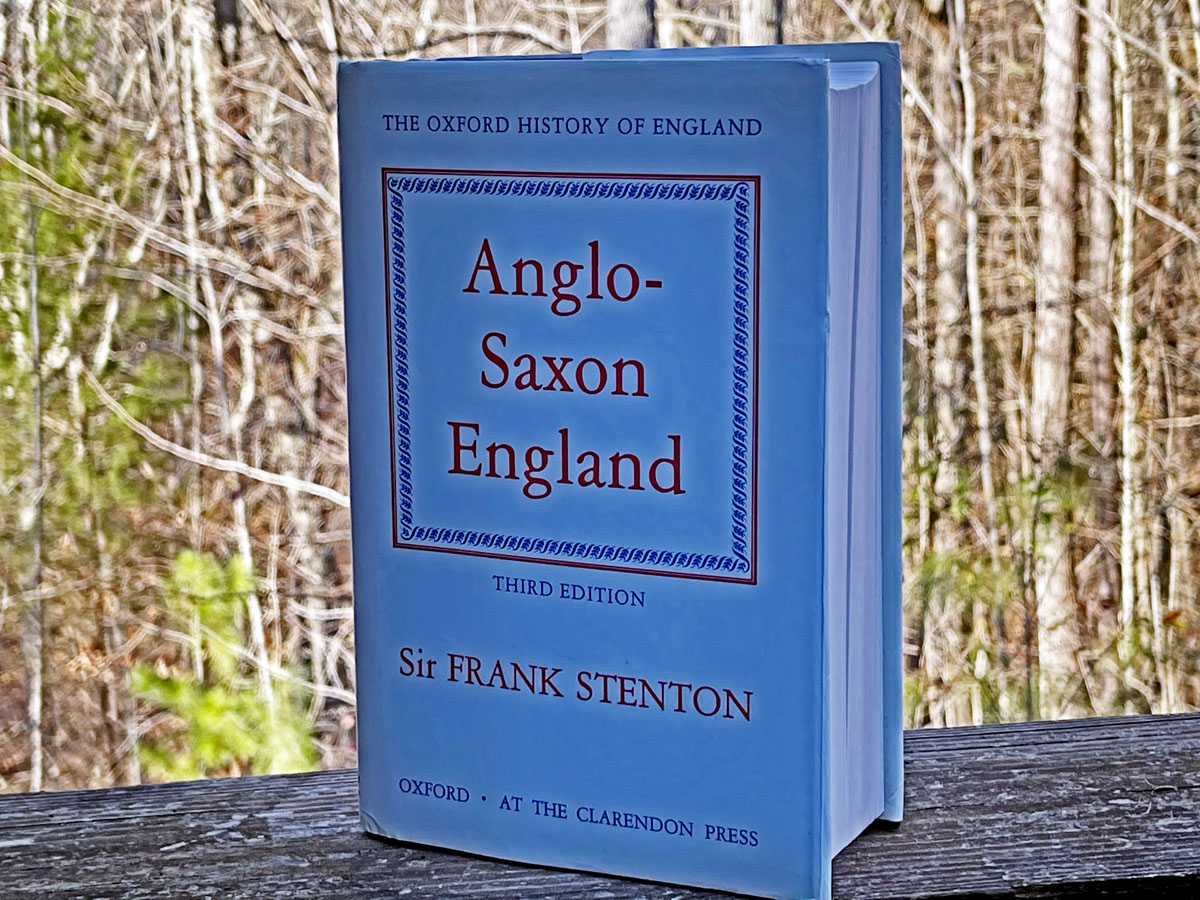
The Oxford History of Anglo-Saxon England. Sir Frank Stenton, Oxford University Press, 1943. 766 pages.
Robin Hood? King Arthur? We all know the myths about Anglo-Saxon England. But if we were called upon to name a fact or two about Anglo-Saxon England, most of us would just scratch our heads.
For a long time, I wrongly assumed that little is known about Anglo-Saxon England. That’s not true. But first, let’s define that period as roughly from 450 A.D. (as Rome’s influence in Britain petered out) until 1066 (the Norman Conquest). If a historian writing in 1943 can write a dense 766-page tome on this period, then obviously it’s not true that little is known. So I will amend my view: Little that is interesting is known about Anglo-Saxon England.
To be sure, a more interesting and more modern book than this one could be written on Anglo-Saxon England. Modern historians concern themselves with more interesting things than earlier historians. (Frank Stenton was born in 1880.) But, if a similarly thorough book on Anglo-Saxon England exists, I have not yet found it. Maybe that’s why this book has gone through multiple editions (1943, 1947, 1971) and multiple printings (1975, 1984, 1985, 1986, 1987). People still buy it.
My No. 1 question about Anglo-Saxon England would be: What might it have been like to live then? Using some imagination to interpolate and extrapolate from what is known about this period, it’s not impossible to make some guesses. Stenton, certainly, had no choice but to limit himself to the available sources — the monk Gildas, for example (c. 500 – c. 570), and the better-known Bede (c. 672 – 735). Here are some less-than-thrilling chapter titles:
The Ascendancy of the Mercian Kings
The English Church from Theodore to Boniface
The Tenth-Century Reformation
The Reorganization of the English Church
Other chapters are somewhat more helpful:
Learning and Literature in Early England
The Conversion of the English People
The Structure of Early English Society
What might it have been like to live then? It was a dangerous time to live. Everyone was exposed to wars and raids. Everyone needed the protection of one of the many little kings. People paid for that protection with the produce of the land, their labor, and military service when required. Most people, of course, were peasants, who mostly lived in villages and subsisted through cooperative farming. As kings granted land and special rights to abbeys and peers, the English manorial system, and an aristocracy, gradually developed.
Vast amounts of effort was spent on churchification. Popes, working from Rome, made repeated efforts to convert the pagans, assert papal power, and establish churches and monasteries. New bishops and their churches popped up all over and gradually grew richer. At first, there was some organized pagan resistance. That resistance steadily died out. I think it would be safe to say that, by the time of the Norman Conquest, paganism in Britain was dead, except in isolated places such as the Scottish Highlands.
Stenton occasionally uses the word “pagan,” but usually he uses the words heathen and heathenism. What this reflects, of course, is the unquestioning assumption of earlier generations that the church brought moral progress and nobler lives to the heathens. I say fiddlesticks. But that’s the way it is in older histories. One has to read older histories as a kind of history of history.
To try to get a feel for what is actually known about this time and place — England during the Dark Ages — by no means makes that time and place less appealing to the imagination. If you want castles and chivalry, you’ll have to wait a bit. But if I had a time machine, good shoes, warm clothing, a squad of bodyguards, and all my vaccinations up to date, this is one of the first places I’d want to go for a visit.

Hi David
After I watched the ITV Robin Hood series years ago I became fascinated by Anglo-Saxon times, which has left me with a particular dislike of the Normans, who really were utter tyrants, even by 11th century standards.
I’m impressed your reading Stenton, I’ve not got there yet but if your interested, Peter Rex has recently written a number of excellent books on late Anglo-Saxon England; ‘Harold’, ‘1066’ and ‘The English Resistance’. For some lighter background reading Michael Wood’s ‘The Doomsday Quest’ gives a good overview from the Iron age onwards. He also wrote ‘In Search of England’ which contains some delightful observations about what life was like in those days.
Julian Rathbone’s ‘The Last English King’ presents a fictional narrative of King Harold’s only surviving bodyguard, who flees across Europe to Asia. Rathbone’s presents a somewhat idealised vision of late Anglo-Saxon England (I sense a Tolkien influence) but its a great read, and he has clearly done his research on the mediaeval landscape.
Hi Chenda: Thank you so much! I will look into all the books you mention. I think there is so much room for stories from this period that are not about Arthur and Robin Hood. There are many lesser kings worth investigating. And it’s very easy to imagine local conflicts between overbearing newcomer ecclesiastics and pagans with deeper roots and different ideas.